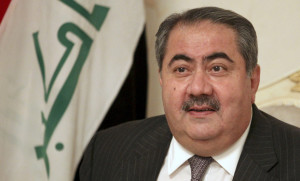
Iraqi Foreign Minister Hoshyar Zebari says Baghdad doesn’t have any ability to stop Iran from flying arms through its airspace to Syria, and suggested that somebody else stop the flights—a seeming invitation to the United States.
It was a second time in a month that Zebari had publicly issued the same strange invitation.
This time he was speaking in Washington to a gathering of the Center for Strategic and International Studies (CSIS).
Asked about the US complaints that Iraq has been allowing Iranian overflights for the better part of a year—overflights that some officials say are almost daily—Zebari pleaded weakness.
“Iraq doesn’t have a single fighter plane,” he said innocently, as if Iraq would have to shoot the Iranian aircraft out of the air. But a country controls its own airspace and all Iraq needs to do is close its airspace to Iranian aircraft.
But Zebari pretended he didn’t know that. “We don’t want them [Iran] to use our airspace,” he said. “We have made clear orders to the Iranians.” He pointed out there are UN Security Council resolutions forbidding Iran to export arms to anyone. But, he said, “We don’t have the capability of enforcing those. So, who is going to enforce this?”
That sounded like another open invitation to the United States.
In July, Zebari said, “Last September, we started to inspect Iranian and Syrian planes at random. We have found non-lethal materials, like equipment, medicine and food.”
In that interview, published July 13 by Ash-Sharq Al-Awsat, the London-based Arabic daily, Zebari said, “In all honesty, those planes might be carrying other stuff, but we have neither the deterrent means, nor the air defenses and fighter jets to prevent … arms shipments.”
In 11 months, Iraq is only known to have ordered five Iranian planes to land in Baghdad for inspections—and one of those was flying from Damascus, not to Damascus. Some Americans believe an Iraqi official is warning Iran in advance what flights will be ordered to land so Iran can make sure those flights have no weapons.
Zebari also issued an invitation last month. “If you imagine these flights breach UN Security Council resolutions banning weapons imports into and exports from Iran,… I invite you, in the name of the government, to help us stop these flights across Iraqi airspace.”
Iraq has no air force to challenge the Iranian planes. But it has the right under international law to order any plane using its airspace to land in Iraq for an inspection. The Islamic Republic constantly assails Iraq and says it has nor right to order Iranian planes to land. But Iran used that same right three years ago to require a foreign passenger flight to land in Iran when Iran learned the plane was carrying Abdolmalek Rigi, the leader of the Baluchi rebel gang Jundollah.
The US Air Force patrolled Iraqi airspace for almost a decade before all US forces departed a year and a half ago.
The simplest action Iraq could take would be simply to bar any Iranian aircraft from Iraqi airspace.
More than a year ago, US officials became aware of frequent Iranian flights to Damascus and started leaning on Iraq to inspect them. US officials said Iranian planes were flying over Iraq on an average of almost one flight a day.
Last September, State Department deputy spokesman Patrick Ventrell said publicly that the US had warned Iraqi officials about the issue. As recently as March 2013, US Secretary of State John Kerry was in Baghdad and urged Iraqi Prime Minister Nuri al-Maliki to inspect more planes flying from Tehran to Damascus.
Zebari said he had urged Western governments to take action themselves if they were convinced that Iran was smuggling weapons to its Syrian ally.
“I told the West: If you want to stop Iran’s air bridge to Syria over Iraq, go ahead.”
While that sounded like an open-ended invitation to the United States to start sending its planes based in the Persian Gulf on interdiction flights over Iraq, there is no way the United States would do so based on a mere comment in an interview. It would require a formal, written agreement with Baghdad.
Zebari, a Sunni Kurd, said Western governments were convinced such an air bridge existed and that his response was: “This [weapons overflights] does not have my consent, but I do not have the means to prevent it.”
He said the Shiite-led government in Baghdad had urged Tehran “not to use relations with [Iraq] to send arms to others.”
“We reject and condemn the shipping of arms through our airspace, and we will tell the Iranian side of that officially, but we cannot stop it,” Zebari said last month.